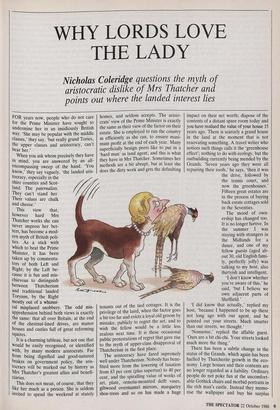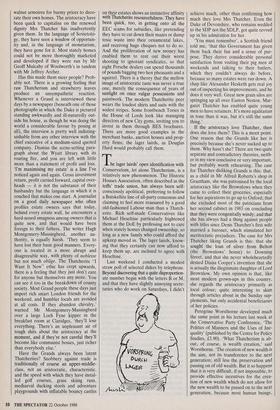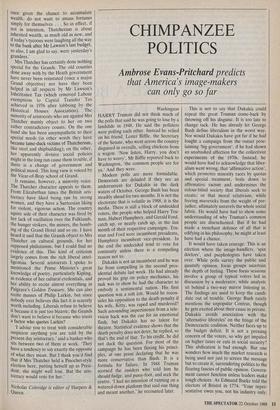WHY LORDS LOVE THE LADY
Nicholas Coleridge questions the myth of
aristocratic dislike of Mrs Thatcher and points out where the landed interest lies
FOR years now, people who do not care for the Prime Minister have sought to undermine her in an insidiously British way. 'She may be popular with the middle classes,' they say, tut really grand Tories, the upper classes and aristocracy, can't bear her.'
It is a charming tableau, but not one that would be easily recognised, or identified with, by many modern aristocrats. Far from being dignified and good-natured brakes on government policy, the aris- tocracy will be marked out by history as Mrs Thatcher's greatest allies and benefi- ciaries.
This does not mean, of course, that they like her much as a person. She is seldom Invited to spend the weekend at stately homes, and seldom accepts. The aristo- crats' view of the Prime Minister is exactly the same as their view of the factor on their estate. She is employed to run the country as efficiently as she can, to ensure maxi- mum profit at the end of each year. Many superficially benign peers like to put in a `hard man' as land agent, and this is what they have in Mrs Thatcher. Sometimes her methods are a bit abrupt, but at least she does the dirty work and gets the defaulting tenants out of the tied cottages. It is the privilege of the laird, when the factor goes a bit too far and evicts a loyal old groom by mistake, publicly to regret the act, and to wish the fellow would be a little less zealous next time. It is these occasional public protestations of regret that gave rise to the myth of upper-class disapproval of Thatcherism in the first place. The aristocracy have fared supremely well under Thatcherism. Nobody has bene- fited more from the lowering of taxation from 83 per cent (plus supertax) to 40 per cent, and the spiralling value of works of art, plate, ormolu-mounted delft vases, giltwood overmantel mirrors, marquetry shoe-trees and so on has made a huge impact on their net worth; dispose of the contents of a distant spare room today and you have realised the value of your house 15 years ago. There is scarcely a grand house in the land at the moment that is not renovating something. A travel writer who notices such things calls it the 'greenhouse effect'; nothing to do with ecology, but the outbuilding currently being mended by the Grands. 'Seven years ago they were all repairing their roofs,' he says, 'then it was the drive, followed by the tennis court, and now the greenhouses.' Fifteen great estates are in the process of buying back estate cottages sold in the Seventies.
The mood of own- ership has changed too. It is no longer furtive. In the summer I was staying with strangers in the Midlands for a dance, and one of my fellow guests (aged ab- out 30, old English fami- ly, perfectly jolly) was talking to my host, also thirtyish and intelligent.
don't know whether you're aware of this,' he said, 'but I believe we own adjacent parts of Sheffield.'
`I did know that actually,' replied my host, 'because I happened to be up there not long ago with our agent, and he pointed out your streets. Much smarter than our streets, we thought.'
`Nonsense,' replied the affable guest. `Ours are a bit chi-chi. Your streets looked much more the thing.'
There has been a subtle change in the status of the Grands, which again has been fuelled by Thatcherite growth in the eco- nomy. Large houses and their contents are no longer regarded as a liability. Ordinary people do not poke fun at the uncomfort- able Gothick chairs and morbid portraits in the rich man's castle. Instead they memo- rise the wallpaper and buy his surplus walnut armoires for barmy prices to deco- rate their own homes. The aristocracy have been quick to capitalise on the renewed dignity Mrs Thatcher has inadvertently given them. In the language of Sovietolo- gy, they have seen a window of opportun- ity and, in the language of monetarism, they have gone for it. Most stately homes could not be more thoroughly marketed and developed if they were run by Mr Geoff Mulcahy of Woolworth's in tandem with Mr Jeffrey Archer.
Has this made them nicer people? Prob- ably not. There is a growing feeling that raw Thatcherism and strawberry leaves produce an unsympathetic reaction. Whenever a Grand is interviewed these days by a newspaper (beneath one of those photographs in which the Duke is pictured standing awkwardly and ill-naturedly out- side his house, as though he was doing the world a considerable favour by posing at all), the interview is pretty well indisting- uishable from any other interview with the chief executive of a medium-sized quoted company. Dismiss the scene-setting para- graph about the Wyatt library with its roaring fire, and you are left with little more than a statement of profit and loss. `I'm maximising my estate' is a line I've noticed again and again. Gross investment return, profit carried forward, capital over- heads — it is not the substance of their husbandry but the language in which it is couched that makes one start. A journalist on a good daily newspaper who often profiles estate owners says that today, behind every estate wall, he encounters a hard-nosed smugness among owners that is quite new, and that would have been foreign to their fathers. The writer Hugh Montgomery-Massingberd, another au- thority, is equally harsh. 'They seem to have lost their basic good manners. Every- one is treated in a more abrupt and disagreeable way, with plenty of noblesse but not much oblige. The Thatcherite "I Want It Now" ethic has crept upwards, there is a feeling that they just don't care for anyone but themselves any more. You can see it too in the breakdown of county society. Most Grand people these days just import rich smart London friends for the weekend, and humbler locals are avoided at all costs. If they abandon chivalry,' warned Mr Montgomery-Massingberd over a large Loch Fyne kipper in the breakfast room at Claridges, 'they'll lose everything. There's an unpleasant air of tough shits about the aristocracy at the moment, and if they're not careful they'll become like communist bosses, just richer than everybody else.'
Have the Grands always been latent Thatcherites? Snobbery against trade is traditionally of course an upper-middle- class, not an aristocratic, characteristic, and the speed with which they have instal- led golf courses, grass skiing runs, mediaeval ducking stools and adventure playgrounds with inflatable bouncy castles on their estates shows an instinctive affinity with Thatcherite resourcefulness. They have been quick, too, in getting onto all the EEC scams for subsidies, like pretending they have to cut down their mazes or dump toxic waste into their ornamental lakes, and receiving huge cheques not to do so. And the proliferation of new money has enabled them to rent out their worst shooting to ignorant syndicates, so that eight Porsche dealers can spend thousands of pounds bagging two hen pheasants and a squirrel. There is a theory that the mellow image of aristocratic taste was never a true one, merely the consequence of years of sunlight on once vulgar possessions and paintwork. The modern Thatcherite peer wears the loudest shirts and suits with the widest stripes. Some frontbench Tories in the House of Lords look like managing directors of new City gyms, inviting you to invest in them through BES brochures. There are more good examples in the merchant banks, auction houses and prop- erty firms; the lager lairds, as Douglas Hurd would probably call them.
The lager lairds' open identification with Conservatism, let alone Thatcherism, is a relatively new phenomenon. The Historic Houses Association, often described as the toffs' trade union, has always been self- consciously apolitical, preferring to follow a Butskellite line of all-party consensus and claiming to feel more reassured by a good old-fashioned Labour man than a Thatch- erite. Rich self-made Conservatives like Michael Heseltine particularly frightened them at the DoE by professing not to care when stately homes changed ownership, so long as a new family who could afford the upkeep moved in. The lager lairds, know- ing that they certainly can now afford to keep them up, are inclined to agree with Heseltine.
Last weekend I conducted a modest straw poll of selected dukes by telephone. Beyond discovering that a quite disproportion- ate number begin with the letters B or M, and that they have slightly annoying secre- taries who do work on Saturdays, I didn't achieve much, other than confirming how much they love Mrs Thatcher. Even the Duke of Devonshire, who remains wedded to the SDP not the SDLP, got quite revved up in his admiration for her.
`You must remember', a Scottish friend told me, 'that this Government has given theni back their fun and a sense of pur- pose. They derive considerable personal satisfaction from visiting their pig men at weekends and talking to their butlers, which they couldn't always do before, because so many estates were run down. A chap like Alexander Hesketh gets real joy out of inspecting his improvements, and he does it very well. Great new grain silos are springing up all over Easton Neston. Mar- garet Thatcher has enabled quite young men to have retainers. It's more egalitarian in tone than it was, but it's still the same thing.'
If the aristocracy love Thatcher, then does she love them? This is a moot point. One reason that the Grands like her is precisely because she's never sucked up to them. Why hasn't she? There are two quite separate and contradictory theories, neith- er in my view conclusive or very important, but probably worth rehearsing. The case for Thatcher disliking Grands is this: that, as a child in Mr Alfred Roberts's shop in Grantham, she was patronised by the local aristocracy like the Brownlows when they came to collect their groceries, especially for her aspirations to go up to Oxford; that she excluded most of the patricians from her second cabinet in 1983 on concluding that they were congenitally windy; and that she has always had a thing against people with titles since Denis Thatcher's first wife married a baronet, which stimulated her meritocratic prejudices. The case for Mrs Thatcher liking Grands is this: that she sought the loan of silver from Belton (the Brownlows' house) to Downing Street, and that she never wholeheartedly denied Diana Cooper's invention that she is actually the illegitimate daughter of Lord Brownlow. My own opinion is that, like most modern grown-ups in this country, she regards the aristocracy primarily as local colour; quite interesting to skim through articles about in the Sunday sup- plements, but only accidental beneficiaries of her policies.
Peregrine Worsthorne developed much the same point in his lecture last week at the Conservative Party Conference, 'The Politics of Manners and the Uses of Ine- quality' (published by the Centre for Policy Studies, £3.90). 'What Thatcherism is ab- out, of course, is wealth creation,' said Worsthorne. 'The creation of new wealth is the aim, not its transference to the next generation; still less the preservation and passing on of old wealth. But it so happens that it is very difficult, if not impossible, to provide effective incentives for the crea- tion of new wealth which do not allow for the new wealth to be passed on to the next generation, because most human beings,
once given the chance to accumulate wealth, do not want to amass fortunes simply for themselves . . . So in effect, if not in intention, Thatcherism is about inherited wealth, as much old as new, and if today's tycoons were laughing all the way to the bank after Mr Lawson's last budget, so also, I am glad to say, were yesterday's grandees.'
Mrs Thatcher has certainly done nothing special for the Grands. The old counties done away with by the Heath government have never been reinstated (once a major Grand objective) nor have they been helped in all respects by Mr Lawson's Inheritance Tax (which removed Labour exemptions to Capital Transfer Tax achieved in 1976 after lobbying by the Historical Houses Association). The minority of aristocrats who are against Mrs Thatcher mainly object to her on two rather contradictory counts. On the one hand she has been unsympathetic to their special needs (in other words they have became lame-duck victims of Thatcherism, like steel -and shipbuilding); on the other, her apparently divisive social policies might in the long run cause them trouble, if there is a change of government and political mood. This long view is voiced by the Vicar-of-Bray school of Grand.
It remains, however, a minority voice. The Thatcher character appeals to them. From Elizabethan times the British aris- tocracy have liked being run by strong women, and they have a Surteesian liking for violent, vigorous action. The country squire side of their character was fired by her lack of vacillation over the Falklands, the hunger strikers, the miners, the bomb- ing of the Grand Hotel and so on. I have heard it said that the Grands object to Mrs Thatcher on cultural grounds, for her supposed philistinism, but I could find no evidence of this. This kind of criticism largely comes from the rich liberal intel- ligentsia. Several aristocrats I spoke to mentioned the Prime Minister's great knowledge of poetry, particularly Kipling, as evidence of her cultural credentials, and her ability to recite almost everything in Palgrave's Golden Treasury. She can also recite masses of Philip Larkin, but since nobody ever believes this fact it is scarcely worth including. Liberals refuse to believe it because it is just too bizarre; the Grands don't want to believe it because who trusts a factor who quotes Larkin?
'I advise you to treat with considerable suspicion anything you are told by the present day aristocracy,' said a banker who sits between two of them at work. 'They have a tendency to say exactly the opposite of what they mean. But I think you'd find that if Mrs Thatcher held a Pinochet-style election here, putting herself up as Presi- dent, she might well lose. But the aris- tocracy would vote for her.'
Nicholas Coleridge is editor of Harpers & Queen.




































































 Previous page
Previous page